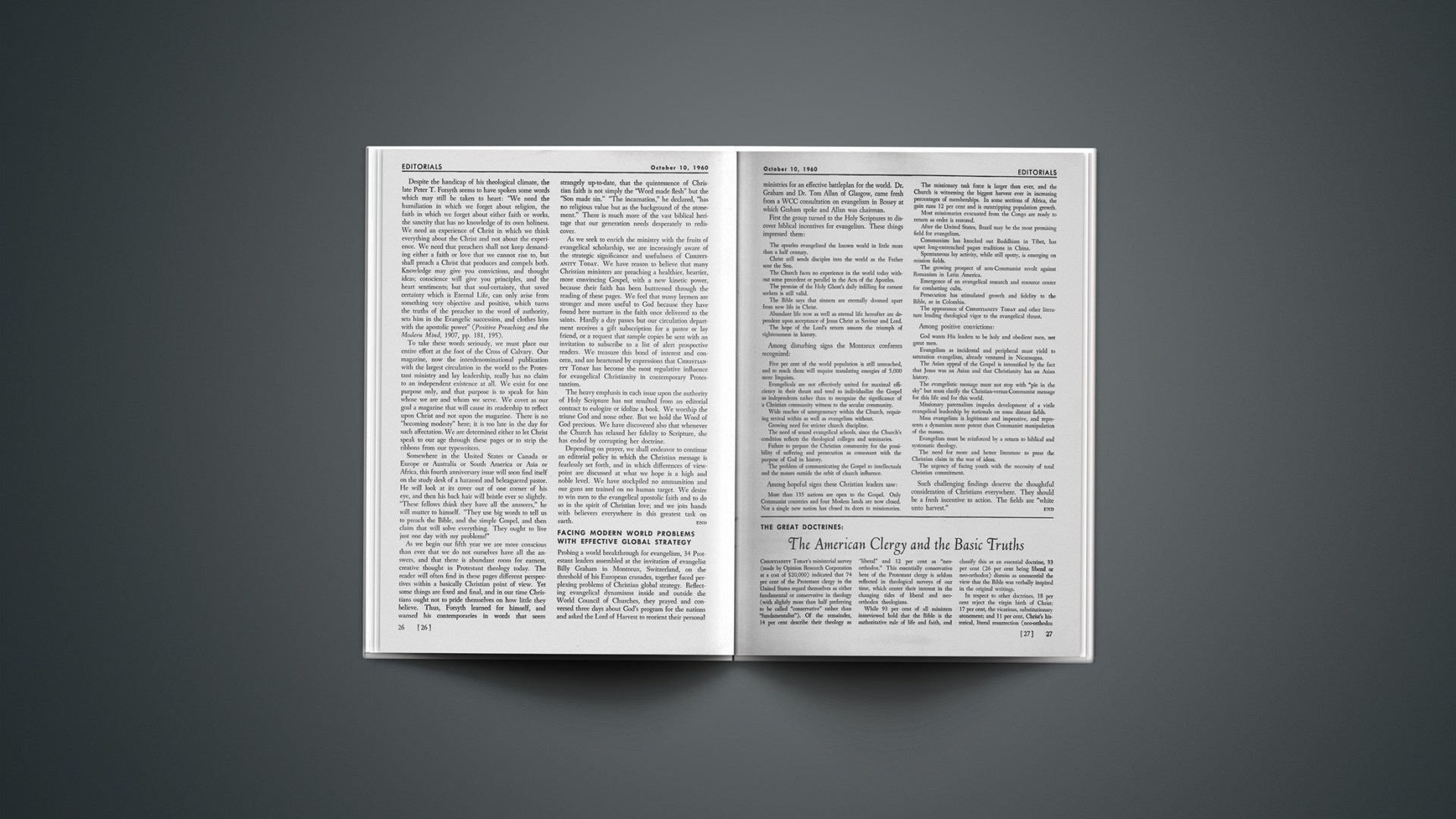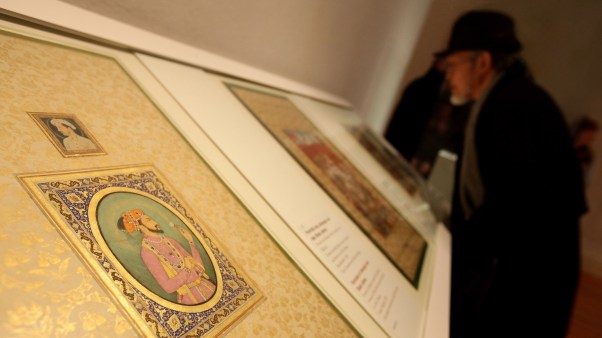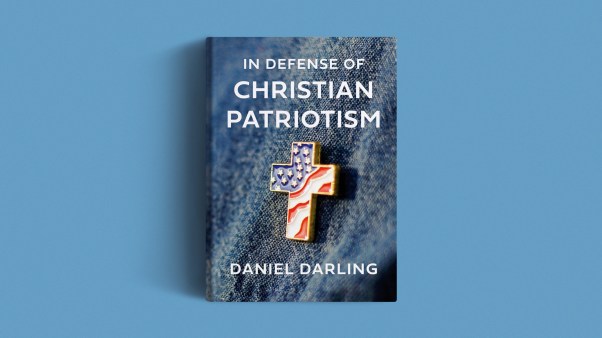Christianity Today’s ministerial survey (made by Opinion Research Corporation at a cost of $20,000) indicated that 74 per cent of the Protestant clergy in the United States regard themselves as either fundamental or conservative in theology (with slightly more than half preferring to be called “conservative” rather than “fundamentalist”). Of the remainder, 14 per cent describe their theology as “liberal” and 12 per cent as “neo-orthodox.” This essentially conservative bent of the Protestant clergy is seldom reflected in theological surveys of our time, which center their interest in the changing tides of liberal and neo-orthodox theologians.
While 93 per cent of all ministers interviewed hold that the Bible is the authoritative rule of life and faith, and classify this as an essential doctrine, 33 per cent (26 per cent being liberal or neo-orthodox) dismiss as unessential the view that the Bible was verbally inspired in the original writings.
In respect to other doctrines, 18 per cent reject the virgin birth of Christ; 17 per cent, the vicarious, substitutionary atonement; and 11 per cent, Christ’s historical, literal resurrection (neo-orthodox ministers being less prone than liberal ministers to question the importance of this doctrine).
Some 89 per cent of the Protestant ministers interviewed think it essential to teach and preach the unique deity of Christ as the Son of God; the others do not.
CHRISTIANITY TODAY’s survey thus attests the fact that the dilemma of modern Protestantism in America stems largely from a lack of doctrinal stability and conviction due to a departure from the Bible.
Interest in Church Union
Despite the contrary impression given by the ecumenical dialogue and some theological literature and ecclesiastical journals, only 27 per cent consider it “very important” to work for organic church unity. Despite ecumenical sentiment indifferent to doctrinal priorities, an impressive segment of the ministry, polled privately, believes that whatever mergers take place should be based primarily on doctrinal accord. Only 18 per cent favor church union through organic mergers, whereas 24 per cent oppose any form of merger. Almost half (48 per cent) of all ministers interviewed believe that church unity should be premised on doctrinal agreement. A summary by theological camps shows that liberal and neo-orthodox ministers tend to support merger based on organic union, and that only 17 per cent of liberal clergymen advocate merger on doctrinal beliefs only. Denominational differences are noteworthy: 83 per cent of Lutheran ministers are determined to accept mergers only on doctrinal beliefs, whereas only 25 per cent of the Methodist clergy take this view.
Denominations and the Creeds
Doctrinal latitude or strictness on particular tenets dramatizes this point. While virtually all Presbyterian ministers insisted that affirmation of “God as Creator of man” is important as a basis of church union, the percentage dropped to 92 per cent among Baptist pastors and 93 per cent among Episcopalian rectors. The lowest percentage was registered geographically in the South.
With respect to the historical, literal resurrection of Christ, only 68 per cent of Methodist clergy, and only 70 per cent of Presbyterian ministers thought the doctrine important as a basis of church unity. The main areas of doubt lie in the liberal and neo-orthodox ranks; only two in five of the liberal clergy and two in three of the neo-orthodox clergy think belief in our Lord’s bodily resurrection important for church unity.
Episcopalian clergy scored low on some other doctrinal concerns: only 93 per cent thought the affirmation of Christ as Saviour and Lord important; only 90 per cent thought the affirmation of one sovereign God important. (One will not be surprised, in view of this, that Episcopalian ministers also showed up most poorly with respect to the Bible as the authoritative rule of faith and life.) Baptists and Lutherans supported the doctrine’s importance for church unity by 97 per cent; Methodists and Presbyterians by 95 per cent; Episcopalians by only 97 per cent.
Both neo-orthodox ministers and liberal ministers showed up better than the Episcopalians as a group, percentagewise, in their view of the importance of the Bible. When this question was addressed in terms of the verbal inspiration of the Bible in the original writings, 87 per cent of the fundamentalist clergy, and 70 per cent of fundamentalist and conservative clergy together, held this an important basis of church unity, whereas only 21 per cent of the neo-orthodox and 23 per cent of the liberal ministers agreed. Only 90 per cent of Episcopalian and Presbyterian ministers thought the unique deity of Christ as the Son of God important (only Methodists held a laxer view on this doctrine, with 88 per cent affirming its importance). One in four liberal ministers thought the unique deity of Christ important as a basis of church unity.
Probed about the virgin birth of Christ, only 48 per cent of Presbyterian and 52 per cent of Methodist ministers thought this important; Episcopalians scored higher (83 per cent) and Baptists (87 per cent) and Lutherans (88 per cent) highest. Only 37 per cent of liberal ministers and 44 per cent of neo-orthodox clergy thought the doctrine significant as a basis of church unity. The figures on the vicarious, substitutionary atonement of Christ were: Methodists, 55 per cent; Presbyterians, 59 per cent; Episcopalians, 66 per cent; Baptists, 83 per cent; Lutherans, 91 per cent. By theological positions, only 42 per cent of liberal and 49 per cent of neo-orthodox ministers considered the doctrine important for unity.
“Second Coming” of Christ
An interesting reaction, not necessarily related to the issue of church union, came from ministers on the doctrine of the literal return or “second coming” of Christ. It was held essential by 32 per cent of the Methodists; Baptists were highest with 83 per cent and Lutherans with 78 per cent; Episcopalians voted 48 per cent and Presbyterians 46 per cent. Only 25 per cent of liberal and 26 per cent of neo-orthodox clergy thought the doctrine significant.
Economic and Religious Liberty
In respect to economic freedom, a majority (three in four) of the United States clergy stand in the free enterprise tradition, a minority lean strongly toward socialism. Four barometer questions indicate that the ministers definitely socialistic in their leanings number approximately one in five.
The first question tested whether religious freedom is jeopardized by a state philosophy involving government ownership of industry (“Economic and religious freedom are linked. If the government owns and operates all industry, religious freedom will disappear”). Of all ministers interviewed, 55 per cent agreed, 22 per cent disagreed, and 23 per cent had no definite opinion. The fundamentalists (64 per cent) are most positive in seeing the connection between economic and religious freedom; the neo-orthodox (46 per cent) least positive. This result indicates the extent to which the American clergy have already accommodated themselves to the fragmented view of freedom (for which a precedent may be found in Franklin D. Roosevelt’s now famous “four freedoms”), rather than viewing human rights and responsibilities in a unitary manner within the revelation of the sovereign God.
The poll of economic sympathies of the Protestant clergy shows a movement during the last 10 years in a conservative direction, while denominational social action pronouncements have meanwhile looked to the left. Whereas a decade ago a ministerial survey indicated that 33 per cent of the Protestant pastors (as attested by their answers to barometer questions) subscribed to the processes by which a socialistic economy is effected, the more recent poll narrowed the figure to 25 per cent (in contrast to 40 per cent for the general population average). Of these, the pollsters designated two per cent of the ministers as Communist, 10 per cent as socialist, and 15 per cent as fellow-travelers in their economic outlook, these being predominantly liberal and neo-orthodox in theological stance. Taken as a whole, the Protestant clergy, as indicated by the same poll, are slowly moving away from their earlier larger commitment to the left toward a more conservative social view.










